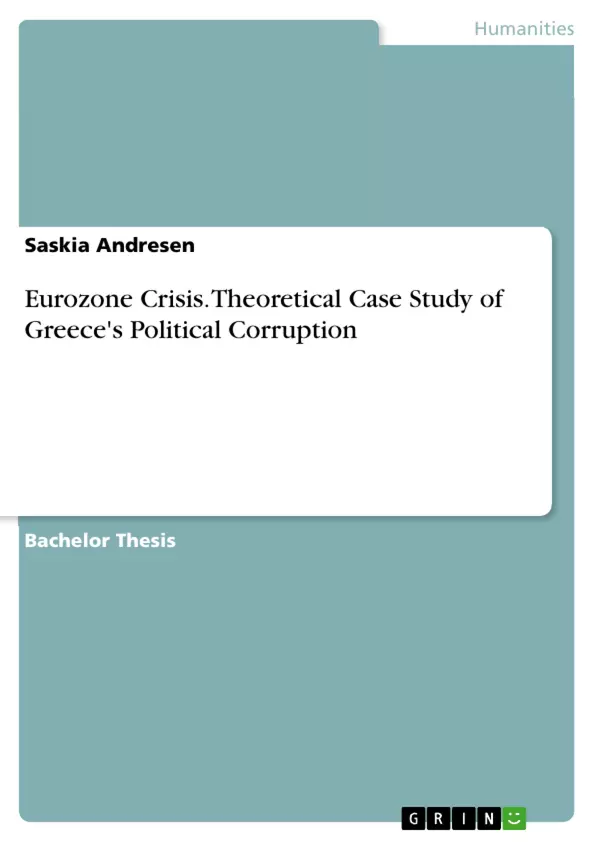The focus of this thesis entails the sociological assessment of political corruption within Greece’s culture and how it has influenced the nation’s present economic status. This investigation is important in order to assess the political and societal causes of Greece’s economic crisis in accordance with the state’s survival in the Eurozone. The research approach adopted in this dissertation includes theoretical evaluations of political corruption, an analysis of the democratic groundwork in Greece, and an extended review of the Ottoman Empire’s taxation methods. The findings of this analysis provide evidence that the governments of Greece reciprocally influenced the fiscal disposition of the private sector, which in turn nominated the governments based on individual preferences. This cycle is a result of the public sector’s mismanagement and the inability to establish an efficient structure upon with the society can fully rely. Thus, the main conclusions drawn from this study are that the Ottoman Empire and its tax ratiocination is a precursor for the nation’s current tax evasion norm, the democratic foundation upon which the political sphere was built caused incentive for bureaucratic corruption, and through the undermining of the society during unorganized government transitions emerged local corruption practices. This dissertation found that these factors contributed heavily, if not caused, the recession in Greece during the Eurozone crisis.
Inhaltsverzeichnis (Table of Contents)
- Abstract
- Introduction
- Defining 'political corruption':
- Asserting the meaning of the term used throughout this thesis
- The Ottoman Empire:
- Understanding Greece's background in peasant exploitation
- Political Violence in Greece:
- Assessing the foundation upon which Greece's current democracy rests
- Local Corruption and Tax Mentality:
- Examining the society's approach to tax evasion and bribery
- Bureaucratic Corruption:
- Scrutinizing main political scandals and theories of political corruption
- Present-day Greece:
- Analysing Greece's current characteristics as a result of tax evasion and political corruption
- Conclusion
- References
Zielsetzung und Themenschwerpunkte (Objectives and Key Themes)
This thesis explores the impact of political corruption on Greece's economic situation during the Eurozone crisis. It aims to analyze the political and societal roots of Greece's economic crisis and its implications for the country's future within the Eurozone. The research focuses on theoretical evaluations of political corruption, the history of Greek democracy, and the influence of the Ottoman Empire's taxation methods.- The role of political corruption in Greece's economic crisis
- The historical roots of corruption in Greece, particularly during the Ottoman Empire
- The impact of political violence on the development of corruption in Greece
- The relationship between local corruption, tax evasion, and bureaucratic corruption
- The cultural and societal factors that contribute to corruption in Greece
Zusammenfassung der Kapitel (Chapter Summaries)
- The introduction sets the stage for the thesis, outlining the topic of political corruption in Greece and its impact on the nation's present economic status. It uses Bertolt Brecht's quote, "Those in the dark are unseen," to illustrate the concept of corruption as a hidden phenomenon.
- Chapter 3 defines the term 'political corruption' as used throughout the thesis.
- Chapter 4 examines the historical roots of corruption in Greece by focusing on the Ottoman Empire and its exploitation of peasant labor. This chapter explores how the Ottoman Empire's taxation methods contributed to the cultural norm of tax evasion in Greece.
- Chapter 5 delves into the transition from Greece's military dictatorship to a democratic state and assesses the impact of political violence on the development of corruption in the public sector. It also explores the emergence of individualism and the weakening of public solidarity during this period.
- Chapter 6 examines local corruption in the private sector, highlighting the prevalence of tax evasion and clientelistic practices in Greece. It also explores the connections between Greece's culture and its corruption.
- Chapter 7 scrutinizes bureaucratic corruption, examining major political scandals and theories of political corruption. This chapter analyzes the connections between bureaucratic corruption and illegal exchanges in civil society, leading up to the Eurozone crisis.
- Chapter 8 provides an account of current events in Greece, highlighting the results of widespread corruption and the social reactions to austerity measures.
Schlüsselwörter (Keywords)
This thesis explores the complex interplay of political corruption, economic deprivation, and historical influences in Greece. Key themes include political corruption, tax evasion, the Ottoman Empire, democratic transition, bureaucratic corruption, local corruption, and the Eurozone crisis. The study examines these themes through the lens of Greek history, culture, and social structures, providing insights into the factors that have contributed to Greece's current economic situation.Frequently Asked Questions
What is the main focus of this thesis on the Eurozone crisis?
The thesis focuses on a sociological assessment of how political corruption within Greek culture influenced the nation's economic status and contributed to the Eurozone crisis.
How is the Ottoman Empire linked to modern Greek tax evasion?
The study suggests that the Ottoman Empire's taxation methods and the exploitation of peasants served as a historical precursor to the modern cultural norm of tax evasion in Greece.
What impact did the transition to democracy have on corruption?
The research indicates that unorganized government transitions and political violence during the shift from military dictatorship to democracy created incentives for bureaucratic corruption and local corrupt practices.
What are the different types of corruption analyzed in the study?
The thesis analyzes political corruption, bureaucratic corruption, local corruption in the private sector, and systematic tax evasion.
How does the study define 'political corruption'?
Political corruption is defined as a hidden phenomenon where those in power influence fiscal dispositions for individual preferences, often undermining public solidarity.
What role did the private sector play in this cycle of corruption?
The private sector nominated governments based on individual preferences, while the government reciprocally influenced the fiscal disposition of the private sector, creating a cycle of mismanagement.
- Quote paper
- Saskia Andresen (Author), 2013, Eurozone Crisis. Theoretical Case Study of Greece's Political Corruption, Munich, GRIN Verlag, https://www.grin.com/document/294285



